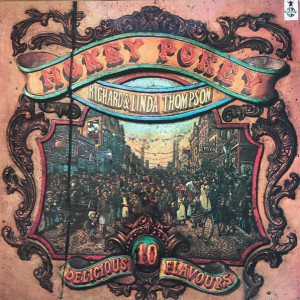 It’s probably going too far to say that Hokey Pokey is an overlooked gem in the Richard Thompson catalog. But this, the second of six studio albums released by Richard and Linda Thompson between 1974 and 1982, generally doesn’t receive the accolades reserved for their first and last. The first, I Want to See The Bright Lights Tonight and the last, Shoot Out The Lights deservedly are considered classics. More than classics, defining moments in British folk music of the era.
It’s probably going too far to say that Hokey Pokey is an overlooked gem in the Richard Thompson catalog. But this, the second of six studio albums released by Richard and Linda Thompson between 1974 and 1982, generally doesn’t receive the accolades reserved for their first and last. The first, I Want to See The Bright Lights Tonight and the last, Shoot Out The Lights deservedly are considered classics. More than classics, defining moments in British folk music of the era.
Hokey Pokey, by contrast, seems like the endearing younger sibling of Bright Lights, particularly when considered on the merits of its title song. It’s a seemingly lightweight and upbeat number built around Thompson’s memories of the Italian ice cream vendors on the streets of suburban London in the fairly grim postwar years when he was growing up. Sung by Linda with Richard on backing vocals, it is laden with double entendres, driven by Timi Donald’s drums and Pat Donaldson’s propulsive bass guitar and punctuated by Richard’s slashing, pointilist guitar work.
The album, as David Suff’s liner notes on this 2004 remastered edition say, was Richard’s attempt at making a slightly lighter statement than the so-called doom and gloom he was already becoming known for. Thus “Hokey Pokey,” the jaunty “Smiffy’s Glass Eye” and “Georgie On A Spree,” and the closing track, a cover of Mike Waterson’s folksy satire of evangelical Christianity, “Mole In A Hole.”
But the illusion of Hokey Pokey as a change in tone is revealed as just that, an illusion, upon closer examination of even these upbeat-sounding songs. “Hokey Pokey” starts with an innocent picture of kids playing in the street, but soon devolves into convicts in prison and transvestites in the alley. “Smiffy” portrays the cruelty of children to one of their own who has a disability, the female protagonist of “Georgie” is left waiting by the phone for a lover who has probably abandoned her, and the good Christian fellow in “Mole” is called home much too early by his Lord.
And that’s just the upbeat songs.
Sandwiched in between them are two of the most world-weary songs in the entire Richard Thompson canon, “I’ll Regret It All In The Morning” and “Old Man Inside A Young Man.” A minor song, “The Egypt Room,” provides a quick and dirty portrait of an exotic dancer and a flashy crook. “The Sun Never Shines On The Poor” details urchins writhing in the mud of the streets, among many hapless poverty-stricken subjects upon whom that sun refuses to shine.
I’ll admit that I and other long-time Richard Thompson fans revel in this sardonic side of the man. It’s of a piece with the folk music of the British Isles going back centuries, and which Thompson was instrumental in bringing into the modern era. So when I assert that all this bleakness is redeemed by one particular song, it’s not that I actually think that Richard Thompson or his music in general, or the songs on Hokey Pokey in particular, require redemption. It’s just a metaphor, OK?
That song, of course, is “A Heart Needs A Home,” one of the most moving love songs in the RT songbook. It’s a sad song, one of longing and perhaps resignation. It also possibly points the way to Richard’s conversion to Islam, which took place about this time, late 1974 or early ’75, and as such can be read with equal validity as a song of surrender to the diety, as can so many of his works from this point on. Either way, it’s simply a stunning work, as good as anything he’s ever done – and that Linda has ever sung – and raises the entire album up several notches in my esteem.
The sound on this remastered edition is quite an improvement over the original CD release, even to my aging ears. I’d be remiss if I failed to mention the sublime contributions of the rest of the band, particularly John Kirkpatrick on various squeezeboxes and Aly Bain on fiddle, and Simon Nicol on lots of things.
This edition also includes five bonus tracks, four of them previously unreleased. Three are covers of American rock ‘n’ roll or country songs: Buddy Holly’s “Wishing,” Merle Haggard’s “I’m Turning Off A Memory” and Cowboy Jack Clement’s “It’ll Be Me.” The latter previously appeared on the odds ‘n’ sods compilation guitar, vocal. Also included is an alternate take of “A Heart Needs A Home,” from a 1975 John Peel BBC show (as are “Wishing” and “Memory”), and “Hokey Pokey” live from the London club The Roadhouse. None of them are absolutely necessary for any but the completists, but the album itself is an essential part of any folk music fan’s collection.
(Island, 1975, reissued 2004)
